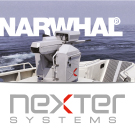| |
|||
| a | |||
Naval
Forces News - France, USA |
|||
USA
& France Take Interoperability A Step Further With USMC V22 Tests
On Board Mistral Class LHD |
|||
On July 5th, the French Navy Naval Aviation Practical Experimentation
Center (centre d’expérimentations pratiques de l’aéronautique
navale - CEPA) led a certification campaign of the United States
Marine Corps (USMC) Boeing V-22 Osprey tilt rotor aircraft on the Mistral
class LHD Dixmude. The tests took place off the coast of Djibouti,
an East Africa country where both France and the USA have permanent
bases. |
|||
 USMC
and the French Navy took their interoperability a step further: In addition
to the regular landing tests, other tests were conducted to demonstrate
the ability of the Mistral class LHD to accommodate a V22. These tests
included embarking and disembarking personnel, refueling and parking
the V22 Osprey on the deck with engines turned off. Picture: F. de Feydeau
/ French Navy USMC
and the French Navy took their interoperability a step further: In addition
to the regular landing tests, other tests were conducted to demonstrate
the ability of the Mistral class LHD to accommodate a V22. These tests
included embarking and disembarking personnel, refueling and parking
the V22 Osprey on the deck with engines turned off. Picture: F. de Feydeau
/ French Navy |
|||
The goal through this certification is to enhance
interoperability between the French and American navies. Mistral class
Landing Helicopter Dock (LHD) Dixmude welcomed a US
Marine Corps V-22 Osprey belonging to the 15th
Marine Expeditionary Unit (MEU) currently deployed on
the Wasp class LHD USS Essex. The V-22 is a tilt rotor aircraft.
Its design allows it to take off and land vertically like an helicopter
but also fly like an airplane. Back in 2014, for the first time, a series
of V22
test landings were made with the Dixmude followed by
the Mistral. A USMC
CH-53 Sea Stallion was also qualified with Dixmude LHD back
in 2012. Finally, back in October 2011, some USAF
HH60G Pave Hawks were detached onboard French Navy's Tonnerre LHD
during NATO operations in Lybia.
For the certification, a landing spot was selected, close to the #1 spot (the only one on the Mistral class designed to sustain heavy helicopters such as the V22 or CH53). This time around, in addition to the regular landing tests, other tests were conducted to demonstrate and certify the ability of the Mistral class LHD to accommodate a V22. These tests included embarking and disembarking personnel, refueling and parking the V22 Osprey on the deck with engines turned off. |
French Navy flight deck, bridge and security teams
were briefed by their American counterparts before the tests. When the
V-22 approached, sailors were impressed by the imposing machine, which
came to rest on the front of the Dixmude
LHD flight deck. This big step for the French Navy has been done under
the control of the CEPA team (dispatched from mainland France for the
occasion) which took place both on board the LHD and the V-22. The presentations
of the aircraft followed one another, followed by temperature measurements
on the deck. The final test was used to disembark personnel and refuel
the V22 with rotating rotors, before cutting the engines off - a first
on a French LHD.
This operation was a great success: all planned measures and maneuvers under were achieved. The experts will now decide on the certification and the future framework of interoperability between V-22 Osprey and Mistral class LHDs. |
|||















